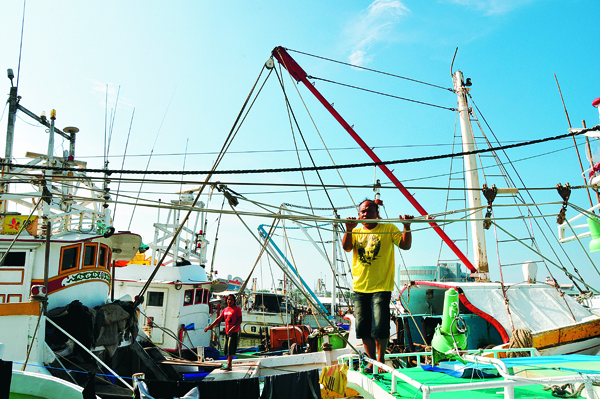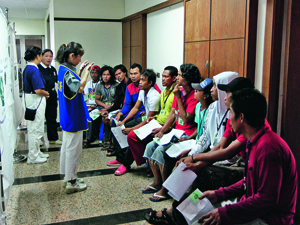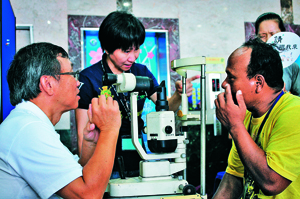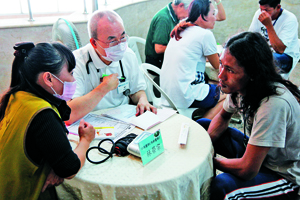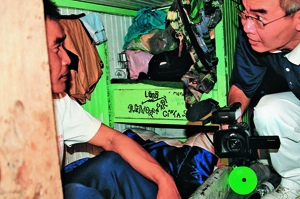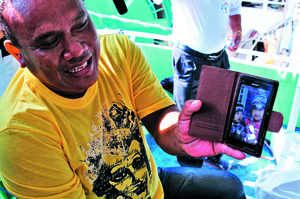

| Foreign Seafarers Go Ashore: Sobirin Gets a Health Checkup | |||||||||||
| By Hu Qing-qing, Xu Yue-e, and Zheng Chun-chun Translated by Tang Yau-yang | |||||||||||
Although Sobirin works on a Taiwanese fishing boat, he originally hails from Indonesia. He is like so many others, men that left their home countries and work hard to support their families back home. On water for long durations of time, they have to endure cramped living conditions and loneliness. The law restricts shore access for foreign seamen when their boats are moored in ports in Taiwan, but this day Sobirin and many other foreign fishermen got ashore for a special occasion—to get health examinations. This was Sobirin’s first medical checkup ever.
Though it was already mid-September, the scorching sun pounding down made it as hot as summer in southern Taiwan. Donggang, a fishing port in Pingdong County, was packed with fishing boats, but it was quiet with few pedestrians walking around in the 90-degree heat. Sobirin lay lazily in a hammock on one of the boats, swinging rhythmically to and fro, his legs dangling over the sides of the hammock, his eyes loosely closed. The boat was moored in the port to pick up supplies, but because he was a foreign seafarer working on a Taiwanese boat, by law he was not allowed ashore. Instead of stretching his legs on land, he whiled away his time in this hammock in a cramped space aft. He had been a crew member on this boat for 18 months. As the salty, moist sea breezes wafted across the boat, he thought of his hometown in Java, Indonesia. That brought a smile to his face as the hammock rocked gently back and forth. “Sobirin!” someone called out. He sat up and looked towards the voice. A middle-aged man and a few people dressed in uniforms of blue shirts and white pants were standing by the boat. “Hurry up and follow me to the fishermen’s association for a health checkup,” the man said in Taiwanese to Sobirin, pointing at a building onshore. Sobirin and his fellow workers knew this man: Huang Jin-tiao (黃金條), a representative of the local fishermen’s association. But they did not dare to move. “It’s OK,” Huang added, trying to reassure the foreign fishermen. “I already cleared this with your boss.” Just then the owner of the boat arrived. He motioned to his workers that it was indeed okay to get off the boat. With the owner’s express permission, the men quickly walked from the stern to the bow and jumped off the boat. Sobirin and his fellow foreign workers kept pace with Huang, their boss, and the others. As the group of people walked along a path flanked by Taiwanese rain trees, a breeze rattled the branches and sprinkled yellow flowers around. Though still not sure about the exact purpose of this visit, Sobirin was glad for the chance to go ashore and walk on solid ground. He felt cheerful. Clinic by the wharf It was barely 9:00 on this Sunday morning, but the area outside the Donggang fishermen’s association building was already bustling with people. Above the entrance to the building hung a red banner that read, “Dongang Healthcare Event held jointly by the Tzu Chi International Medical Association and the National Immigration Agency.” A few rectangular tables draped with blue cloths were set up neatly in front of the building. A line of medical and translation volunteers sitting at the tables were busily attending to some foreign fishing workers. The volunteers collected the workers’ personal information, took their blood pressures, and measured their blood sugar.
Inside the building, volunteers on either side of the busy lobby offered their services in dentistry, ENT, ophthalmology, and pharmacy. On the second floor, other medical volunteers provided ECGs, abdominal ultrasounds, traditional Chinese medicine, and internal medicine. Sobirin and his cohort followed their boat owner and volunteers into the building and then got in line to receive some documents. After a quick glance at the documents he received, Sobirin was just about to ask questions when a volunteer approached and spoke to him about the event in Indonesian, Sobirin’s mother tongue. Only then did he understand that all of this was a joint effort of the Immigration Agency and a private charity to provide health checkups to foreign laborers in the fishing trade. Sobirin had never had a health checkup. They are very expensive in Indonesia, and most people cannot afford them. Working on the Taiwanese fishing boat, he only took over-the-counter medicine whenever he felt unwell, whether at sea or in port. Seeing a doctor was an unimaginable luxury to him, not to mention having a medical checkup. He said excitedly through an interpreter, “This is my first health checkup ever.” Between two hundred and a thousand foreign fishermen like Sobirin pass in and out of the Donggang fishing port every day. Though some are Filipinos, most of them are from Indonesia, working to help support their families back home. However, the laws are such that foreign seamen are not free to go ashore when their boats are in port. Getting medical care is, as a result, inconvenient for them. The Immigration Agency has therefore actively sought out private organizations as partners to alleviate the situation. Their efforts led to the inaugural health checkup held in conjunction with the Tzu Chi International Medical Association (TIMA) on March 23, 2014. Many foreign sailors were out at sea when that event was held, so TIMA and the agency conducted another checkup on September 14. The second event is the one featured in this article.
Chen Si-cun (陳泗村), from the Immigration Agency, is very positive about the contribution of foreign laborers to the fishing industry in Taiwan. “In an effort to reach every targeted laborer for our September 14 event,” he said, “our agency notified employment agencies [through which foreign workers find work on boats in Taiwan], customs brokerages, and boat owners. We even got the word out through local radio stations. Consequently, we have a larger turnout this time.” Based on their experiences with the first event, organizers knew they’d need more interpreters for this one. As a result, they rounded up more than 20 interpreters who could speak Indonesian or English. The Immigration Agency contributed seven of the interpreters, and employment agencies and Tzu Chi provided the rest.
Familiar tongue Sobirin was curious about every checkup item. When a medical worker took his blood pressure, he watched another worker close by check a man’s blood sugar. None of these procedures were familiar to him. An interpreter by his side explained everything to him. When ophthalmologist Zhuang Cong-ji (莊聰吉) examined Sobirin’s eyes, Sobirin told the doctor through volunteer interpreter Lin Cai-wei (林彩葳) that he had accidentally splashed diesel fuel into his left eye while refueling at sea. He had only rinsed it with fresh water, and for several days he had felt a dull pain in the eye. He paid no heed to the discomfort until he noticed that he could not see as well as before with that eye. He eagerly wanted to know what had gone wrong. After a careful examination of the eye, Dr. Zhuang found that the diesel fuel had caused inflammation of the cornea. Though it had already scabbed, Sobirin’s vision had been seriously damaged. Lin, the interpreter, relayed the message as the doctor explained the situation. Sobirin looked grave as he listened. He asked worriedly, “Will it heal? Will my vision return to the way it was?” The doctor shook his head, but quickly added, “I’ll give you some ointment. If you care for your eye nicely from now on, at least the condition won’t get worse. But remember to wear goggles when you perform that sort of operation again. Be sure to protect your eyes.” Lin took the ointment from the doctor and showed Sobirin how to apply it, and she repeatedly told him to remember to take protective measures in the future. Sobirin’s mood was affected by what he had learned from the ophthalmologist, but by the time he had taken the abdominal ultrasound and ECG tests and learned that the results showed that he was largely all right, he lightened up quite a bit. He chatted cheerfully with another boat worker while waiting for his turn in the internal medicine station, the last stop. Later, Dr. Lin Rong-tsung (林榮宗) read the results of all the examinations that Sobirin had been through and said to him, “You have signs of a fatty liver. You need to watch your weight.” To help Sobirin understand Dr. Lin’s message, a nurse, unable to speak Indonesian, ran in place and swung her arms back and forth while pointing at Sobirin’s distended belly. He looked at her well-intentioned but comical motions and burst out laughing. “You’re saying that I’m overweight?” he asked in Taiwanese. His question astonished all the people within earshot. Someone blurted, “You can speak Taiwanese?” “Just a little,” he replied. “Why didn’t you say so earlier?” the nurse said with a smile. “That woulda saved me a lot of work!” On this day, 123 foreign fishing boat workers had their health checked. The event could not have gone as well without the help of the interpreters on site. Lin Yu-zuan (林玉鑽) was responsible for translating between Indonesian and Chinese at the dental clinic. She had carefully written down simple phrases in both languages for the dental service providers and recipients to help things proceed more smoothly. Some interpreters even brought their own children with them to the event. These children knew enough about the languages to function as ushers of sorts, leading patients to where they needed to go. Lin Cai-wei, who had helped interpret for Sobirin, was a Chinese Indonesian. She had moved to Taiwan when she married a Taiwanese man 23 years earlier. Though she already had known a little Taiwanese before moving here, she still had a hard time adjusting to her new life. Therefore, she could really understand the tough times that the fishing crew from abroad had had to endure: “In addition to the language barrier, they must also face homesickness, which is the most difficult to deal with.” She had wanted to help as soon as she found out about the health checkup, and she drove over half an hour from Kaohsiung early that morning. “We’re all from Indonesia, and I want to do what little I can to help give them warmth.”
A glimpse of boat life After Sobirin and his fellow workers had finished their checkups, they walked back to their boat. A few Tzu Chi volunteers got permission from the boat owner and followed them aboard. The inshore fishing boat, 20 meters by 6 meters (66 by 20 feet), had a crew of six. When the volunteers boarded, they saw a worker scrubbing his clothes on deck while other clothes had been hung on ropes to dry in the sun. The man doing his laundry was astonished to see the strangers. Sobirin explained to the visitors that ordinarily only the boat owner and the crew would ever show up on deck. Other people had almost never had the occasion to visit. Sobirin had also made a living by fishing back in Indonesia, but the life was very difficult. “We weren’t paid cash. Instead, we divvied up the catch among us, and it was up to each person to sell his fish. If we caught nothing, we ended up with no income.” That made for fluctuating incomes, a source of tension for Sobirin, a married man with two young children. So about 18 months ago, in 2013, he found his current job through an employment agency. Though he had to leave his family behind and come to live in Taiwan, it was a job that offered a steady income. A fellow Indonesian worker on the boat, after working for only a few years in Taiwan, had already been able to earn enough to build a new home for his family in Indonesia. Sobirin envied him. The volunteers followed Sobirin through a one-square-meter (3.3-sq.ft.) opening in the deck beside the galley, which led to the crew’s living quarters down below. What they saw shocked them. “It’s so low and so narrow. How do we get in?” After gauging the situation for a little while, they proceeded forward on all fours through a passageway that was about 80 centimeters wide and less than one meter (2.6 by 3 feet) high.
Small, box-shaped recesses were set into the sides of the passageway, each only large enough for a person to lie down. “These are our bunks,” Sobirin pointed out. In the dim glow, clothes, comforters, water bottles, and other things jammed each sailor’s berth. An unpleasant diesel smell filled the air in the trapped heat. Sobirin sat on his bed, but his feet stuck out into the narrow passageway. At times he had to pull his feet up onto his bed to let others through. He seemed to take the cramped space in stride: “It’s not just us Indonesian crew members who live here—the Taiwanese do, too.” Tears welled up in the eyes of Lin Shu-hua (林淑華), the interpreter for the volunteers. Her husband worked on a boat too, but she had never boarded his vessel since marrying him and moving from Indonesia six years ago. “I only see that he’s really tan from working on the sea. But I could never have imagined that he lived like this….” Afterwards, the group of people crawled out of the hot, stuffy cabin. “Does your family know that you have such a tough job here?” a volunteer asked Sobirin. Sobirin shook his head, his eyes teeming with emotion. He sat on his hammock quietly for a while before taking out a cell phone from his pocket. Showing the volunteers a photo of his two daughters on the phone, he smiled contentedly and said, “For them, no work is too hard for me.”
When the boat owner came on board to check how his workers had fared on the health checkup, Sobirin produced from his pocket a piece of crumpled paper and handed it over to him. The owner read it through and said to the volunteers, “This doctor of yours was very thoughtful.” He then said to the boat’s cook, “From now on, use less salt and oil when you cook and refrain from deep-frying as much as you can.” The piece of paper was a note that a doctor at the health checkup had written and asked Sobirin to pass on to the boat owner. The doctor’s mindfulness helped the boat owner understand the need and the way to better care for his workers. When workers win, the owner wins too, and that was exactly what Huang Jin-tiao, the fishermen’s association representative, loved to see happening. Huang used to work on a boat when he was younger, so he knew first-hand the hard life of fishing workers. “The hard work is only one part. Coupled with that are the monotony and boredom of life on board as well as the homesickness, which is the hardest feeling to deal with,” he said. Huang hoped that, through activities such as the health checkup, foreign boat workers could feel loved and cared for. “We must not discriminate against them. Instead, we should treat them like our own family or fellow countrymen. With mutual respect we can perhaps avoid unnecessary conflicts among us.” Suddenly, the boat rattled violently and somewhere an engine roared to life. A neighboring boat was setting out to sea. Its workers shouted to be heard above the noise of the engine. Sobirin ran towards the bow of his boat and stared at the space between his boat and the departing one, keeping an eye out to prevent a collision from happening. The boat sailed away. It was the beginning of another journey. |















|

